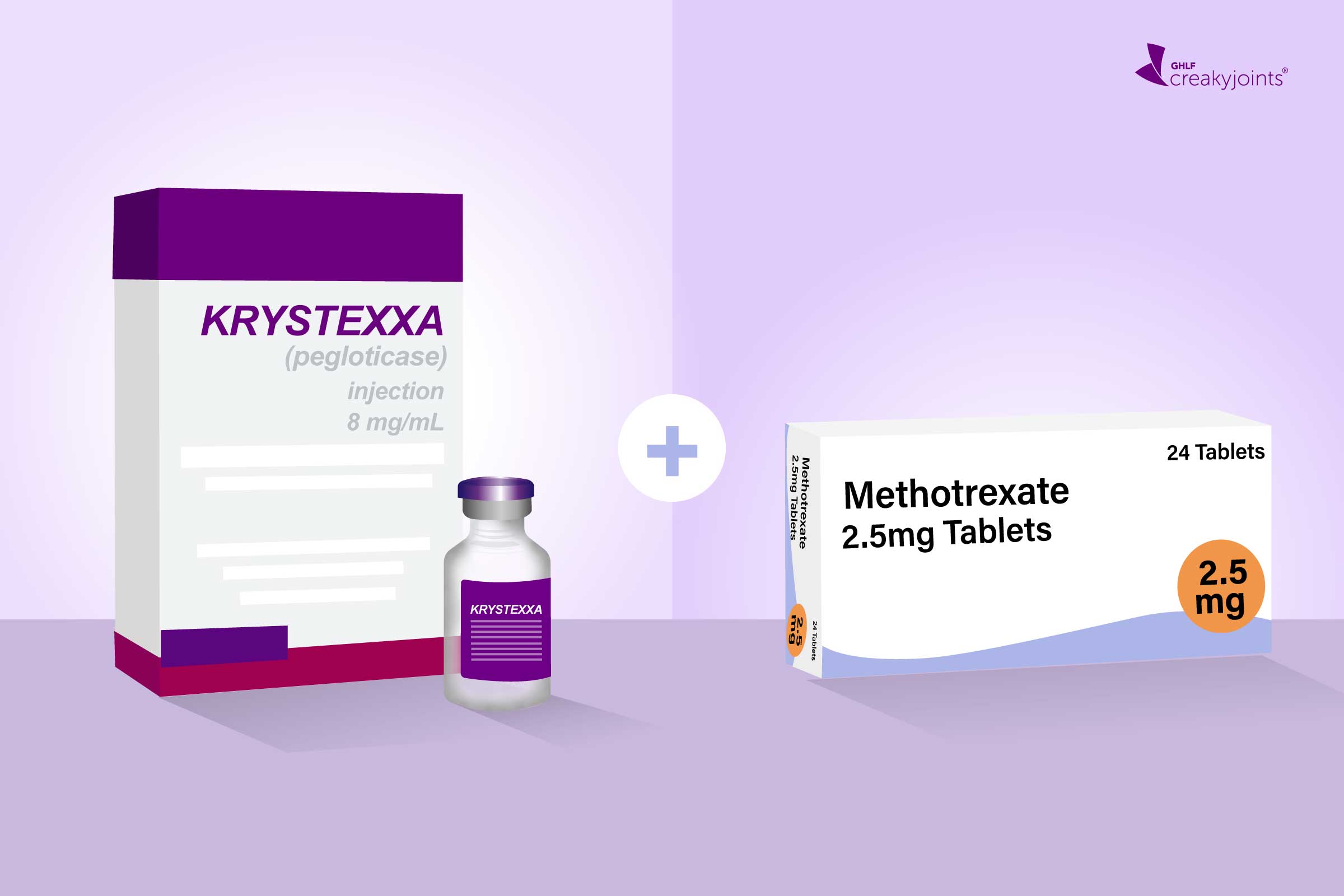Gout — a form of inflammatory arthritis that occurs when uric acid (a normal waste product) accumulates as crystals in the joints, causing pain — often requires treatment with medication to lower levels of uric acid in the blood. The uric acid-lowering medication allopurinol is considered a first-line treatment for gout, but not everyone responds to this traditional urate-lowering therapy.
Those who don’t are more prone to painful gout attacks (often impacting the joint in the big toe as well as other joints), as well as physical disfiguration resulting from a buildup of crystallized urate deposits called tophi. People with chronic gout may also be more prone to common gout complications, such as kidney stones, heart disease, and bone loss.
One of the few available therapies for gout patients who don’t respond to traditional uric acid-lowering treatment is pegloticase (Krystexxa), which was FDA-approved in 2010 for treatment-resistant gout. Unlike allopurinol, which prevents the production of uric acid, pegloticase works to turn uric acid into a substance that your kidneys can more easily eliminate.
But one challenge with this medication, which is given as an infusion, is that many patients produce antibodies against pegloticase to the point that it isn’t as effective.
Recent research suggests the best way to combat this problem may be to combine pegloticase with a medication that acts on the immune system to reduce the production of such antibodies. These medications, known as immunomodulators, include methotrexate and others.
In June 2020, CreakyJoints reported on two preliminary studies that found that combining methotrexate with pegloticase significantly increased the likelihood that pegloticase would work effectively and patients could keep their urate levels low.
Now a systematic review, published in the journal Seminars in Arthritis and Rheumatism, confirms what the earlier trials had found.
The review, which was led by Duke University rheumatologist Robert Keenan, MD, examined data from 10 earlier studies that looked at combining pegloticase with an immunomodulator. Methotrexate was the immunomodulator most often used (in about half of the 82 cases studied) but some patients used mycophenolate mofetil, azathioprine, leflunomide, or cyclosporin instead.
According to the findings, taking an immunomodulator along with pegloticase made a huge difference. Overall, the pegloticase plus immunomodulators had an 83 percent response rate, whereas taking pegloticase alone only had a 42 percent response rate.
Should You Take a Combination of Pegloticase and an Immunomodulator?
If you’re taking or considering pegloticase to manage gout that is not well-controlled on other medications — and your doctor has not mentioned taking an immunomodulating medication along with it — consider asking about this research and whether it’s a good idea for you.
The authors cited data from a prescription analysis that showed that the use of immunomodulators along with pegloticase has been increasing steadily over the past few years: 1 percent in 2016, 4 percent in 2017 and 2018, and 15 percent in 2019.
The authors said that it’s important to keep learning more about how different immunomodulatory medications, route of delivery (oral vs. injection or infusion), and timing affects pegloticase response rates. “Our preliminary findings suggest that a variety of immunomodulatory agents are effective in improving responder rates, which would allow physicians flexibility to use the immunomodulator best suited for each patient,” note the authors.
Though the findings are compelling, the authors of the review wrote that the results, “can only be used as preliminary findings and do not replace the need for more rigorous and direct comparisons.”
Still, the authors are confident that “this systematic review of the current literature suggests that use of immunomodulation in conjunction with pegloticase may significantly increase the proportion of severe gout patients who can benefit from pegloticase and community-wide adoption of this practice is increasing.”
Track Your Medications with ArthritisPower.
Join CreakyJoints’ patient-centered research registry and log your medications to track side effects and impact on disease activity. Join here.
Horizon Therapeutics, which manufactures pegloticase (Krystexxa), is a corporate sponsor of the Global Healthy Living Foundation.
Keenan RT, et al. The effect of immunomodulators on the efficacy and tolerability of pegloticase: a systematic review. Seminars in Arthritis and Rheumatism. April 2021. doi: https://doi.org/10.1016/j.semarthrit.2021.01.005.






